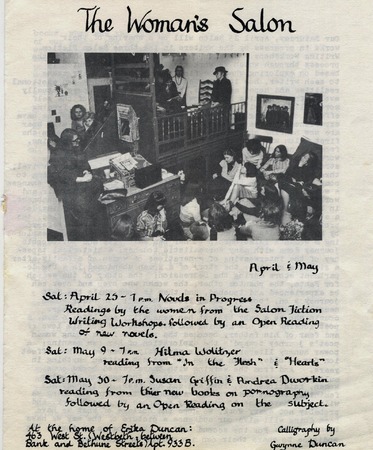WVRHC receives two grants to support Feminist Activist Collection
Posted by Monte Maxwell.May 25th, 2021
The West Virginia and Regional History Center, a part of West Virginia University Libraries, has received grants from the West Virginia Humanities Council and the WVU Humanities Center to support the development of the West Virginia Feminist Activist Collection (WVFAC).
“The West Virginia Feminist Activist Collection brings together the records of people and institutions that worked to advance women’s rights. The materials hold the stories of challenges and change for women in West Virginia. The archive will be useful for scholars, teachers, and anyone interested in women’s history,” WVRHC Assistant Director Lori Hostuttler said.
The grants – $19,998 from the Humanities Council and $12,601 from the WVU Humanities Center – will enable their team to conduct outreach, collect papers and oral histories, and hold educational programs across the state to educate West Virginians about archival practices and women’s history.
Traditional archival collecting has left gaps in the historic record. Often the voices of those who challenged traditional power structures have been silenced, including feminists who fought for gender equality. Additionally, many members of the public are unfamiliar with archives and do not realize that their personal records may be historically significant. The WVFAC aims to demystify both archives and scholarly research by highlighting the importance of preserving feminist records.

“When we lose the records of social movements, we lose the possibilities that they offer. We lose possible ways of living our own lives. Our own world is poorer for the loss,” archivist S. Ziegler wrote in a 2013 essay.
The WVFAC project began in 2017 with a small group of women from the Charleston area who were interested in documenting the efforts of West Virginia feminist activists. Along with archivists at the WVRHC and WVU humanities scholars, the group spent three years planning, building interdisciplinary institutional support, and networking with potential contributors to the collection.
Dr. Jennifer Thornton and Dr. Jessie Wilkerson from the WVU History Department are key partners in the project. Dr. Ellen Rodriques, Interim Director of the WVU LGBTQ Center, is serving as a consultant. Professor Emerita Judith Stitzel, founding Director of the WVU Center for Women’s and Gender Studies has also supported the WVFAC through planning and promotional efforts and importantly, a generous financial donation to support the work.
“Contributions from donors like Dr. Stitzel energize projects such as this. We are grateful for her participation and support,” Hostuttler said. “The project is launching from a good foundation.”
The WVRHC currently houses a number of collections related to feminist activism, including the papers of suffragists and Black activists. And, because of the efforts of the WVFAC, the Center has recently acquired the papers of Christine Daugherty and Lisa Diehl, West Virginia activists who worked to improve employment opportunities for women; the records of the reproductive health advocacy organization WV FREE; and the papers of state legislator Barbara Evans Fleischauer.
These grants will allow them to move into a new phase that includes educational events featuring humanities speakers, the design and printing of educational and promotional materials, consultation meetings with feminist activists across the state including women of color, and the collection and transcription of oral histories.
In addition, funding will support the expansion, maintenance, and use of the WVFAC at the WVRHC, helping to secure and preserve relevant materials and ensure their future use.
Their results will help document the struggles, experiences, contributions, and accomplishments of feminist activists and support teaching, learning and research with these materials at WVU and at institutions around the state and beyond.
The WVFAC will expand knowledge and understanding of how West Virginians sought to advance this nation’s ideals of freedom, justice, and equality, making sure that the state’s motto Montani Semper Liberi extends to all.
Learn more about the WVFAC by visiting this website and viewing this online exhibit.
Caption:
The Women’s Salon Newsletter, April/May 1979, from the Judith Stitzel collection at the WVRHC, is an example of materials preserved in the WVFAC.





